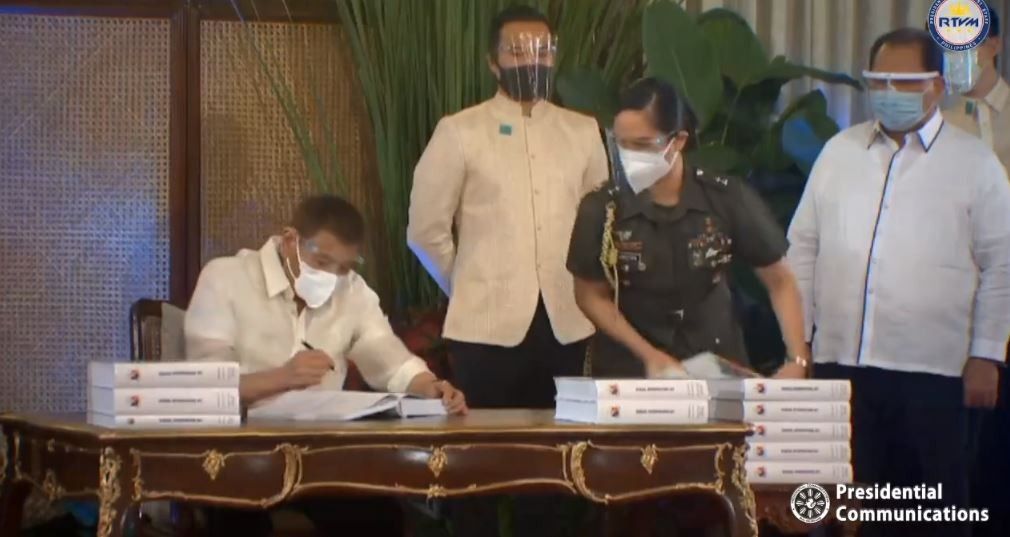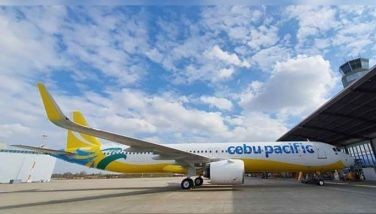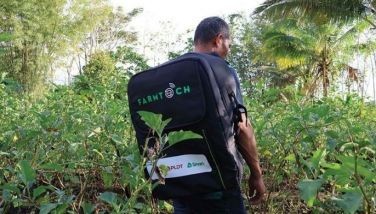Duterte signs 2021 budget with eyes set on pandemic rebound

MANILA, Philippines — President Rodrigo Duterte signed on Monday evening the P4.5 trillion spending plan for next year, targeted to fund programs to ensure the economy realizes an ambitious bounce-back next year.
Four days before the year ends, Duterte's signature seals a break from the last two years that government operated under a budget stretched from the previous year and new programs left unfunded. Such delays took 4 months in 2019, when the budget was only signed in April.
Duterte's penultimate budget next year would be higher by 9.9% from 2020's P4.1 trillion. Presidential spokesperson Harry Roque earlier said it was certain Duterte would veto parts of the budget, but information about these were unavailable as of this posting.
In a prepared speech after signing the General Appropriations Act, Duterte said meeting the deadline of the budget signing is a "testament of our commitment to set aside divisive and partisan politics."
He has said too that the country could no longer afford "to engage in politics of division, hate and finger pointing," despite publicly criticizing and shaming critics, including no less than Vice President Leni Robredo in his weekly address.
Budget allocations
By law, the education sector received the lion's share in next year's funding at P708.18 billion, followed by the public works department with P694.82 billion as the agency was tasked to carry out the administration's flagship "Build, Build, Build" infrastructure program.
The interior department, meanwhile, will receive P247.51 billion, with the P16 billion funding for its anti-communist insurgency efforts that had been questioned by lawmakers also being retained.
The health department along with the Philippine Health Insurance Corp. that had faced mounting corruption allegations this year, were allocated a combined P287.5 billion budget.
By sector, P1.66 trillion will fund social services, cornering 37% of the total outlay. A total P1.32 trillion will finance economic services including infrastructure, P747.8 billion for general public services, P560.2 billion for debt burden and defense with P206.8 billion.
Pandemic response
Duterte, also in the same address, touted the P72.5 billion for vaccine procurement as the most important piece in the budget, having promised to inoculate 24.7 million Filipinos early next year.
Questions, however, continue to hound the government's vaccination program, with senators setting a probe on the matter in January. The administration is also facing criticism that it was late into talks for securing doses amid a global race, with its neighbor Indonesia already sure of 335.5 million doses per a global tracker's report.
Members of the upper chamber are also questioning as well why the Duterte government is keen to secure 25 million doses of the Chinese-made Sinovac. Not only is the Chinse jab's efficacy rate of 50% faring way below that of Western counterparts developed by Pfizer-BioNTech and Moderna drugmakers, the inoculation is also more expensive.
Apart from vaccine purchase, other programs related to COVID-19 response include P71.4 billion for the National Health Insurance, P4.7 billion for procurement of two million personal protective equipment sets and P7.8 billion for repair and upgrading of health stations in communities.
A virology institute under the science and technology department will also receive a fresh P283 million funding, and P51.56 billion set for disease surveillance. — Christian Deiparine
- Latest
- Trending





























